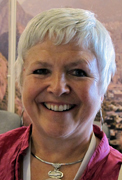Policy Bite: Migration & refugee health – new challenges
 With Amanda Howe
With Amanda Howe
español
The recent situation of rapid and unplanned migration in Europe has raised my awareness of a situation which many other regions have already experienced. The WONCA Europe conference saw the launch of the ‘
Istanbul statement’ on refugee health, and much discussion both within workshops and plenaries about the needs and challenges for family doctors. The very active special interest group (SIG) on migrant care hosted two workshops on refugee and migrant child health, and Prof Jan de Maeseneer in his plenary challenged WONCA to add to these initiatives with policy and evidence on good practice. Another group launched at WONCA Europe was the ‘
WONCA SIG on Conflict and Catastrophe medicine’, whose remit also relates to this area.
I also spoke with many colleagues who had become involved in their local situation: doing shifts in temporary clinics as people passed through their countries - or became ‘stuck in transit’ due to border closures. So this is a theme that touches many, and those of us whose countries do not yet feel the force of large numbers of unexpected migrants will still empathise both with the people and the doctors who are helping them.
As clinicians, family doctors are well equipped to deal with the basic needs of migrants, but this work is challenging because of its urgency, the different work of doing triage (basic screening and urgent treatment, prioritisation and risk assessment), and the emotional distress and unpredictable situation. Also governments have different political positions and organisational capacities – some mobilising emergency plans in a very proactive manner, others aiming mainly for rapid transition or blocking of these large groups rather than any planned management.
The main risks for the people in transit include meeting basic needs of shelter, clean water and food, hygiene, and personal safety. Physical violence, accidental trauma, theft, and exploitation are all risks, as are increased rates of infective and acute illness due to proximity, exhaustion, lack of facilities, and stress. Doctors working with these groups are also at potential risk, especially if there is lack of protective equipment such as masks and gloves: and the strain of the situation can lead to aggressive reactions in the care setting, although also great gratitude and appreciation of care given.
So what is WONCA’s role? At international level, to raise awareness and to advocate – the Istanbul statement makes nine recommendations for action, mostly at national level, all aiming to ensure appropriate care and avoidance of harm. This means that member organizations will be the main route by which action is taken, and through which both role modelling (‘we care, we want to help’) and practical advice on behalf of members can be given. As individual members, how we act depends on what we are faced with – long-term refugee settlement in countries such as Jordan, new migration across borders due to conflict or natural disasters, or ‘awareness at a distance’. So, for me personally, I see the situation every day on the world news, but do not live close enough to any border to have groups of unplanned migrants in my area. I do meet people migrating for work or study, but this is usually planned and they have access to health care in my country, so this is different scenario. So my action can mainly be via others.
What needs to come out of this? WONCA should appreciate and recognise the work of our members who are directly supporting health care for refugees: promote awareness of the challenges, including those of witnessing and reporting potential human rights issues ; develop evidence based guidance to support advocacy and practice; and try to participate where possible in any relevant initiative of health care support. We need to advocate for proper training and resourcing of services for migrants, including interpreter services which will be crucial. We also need to be realistic in terms of what family doctors can offer: engagement with civil emergency planning may avoid unrealistic expectations of the primary care workforce, and national membership organisations can have a role in this negotiation. Finally, as citizens, with our students, and with our colleagues, we can discuss what is needed to provide high quality compassionate care, reduce stigma, and minimise risk to the refugees, our own communities and ourselves. I congratulate all those who raised this formal motion at WONCA Europe Council, those family doctors who are actively championing this issue, and look forward to more work on this difficult area.
Amanda Howe
President Elect
1. Full name is ‘
Migrant care, international health and travel medicine’